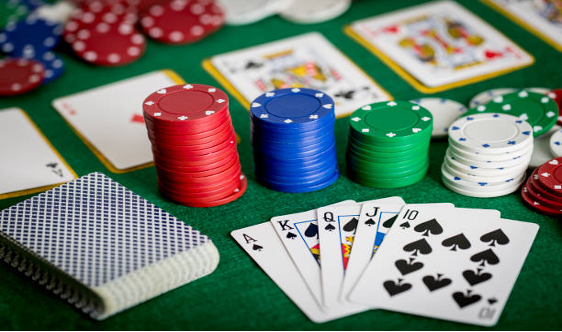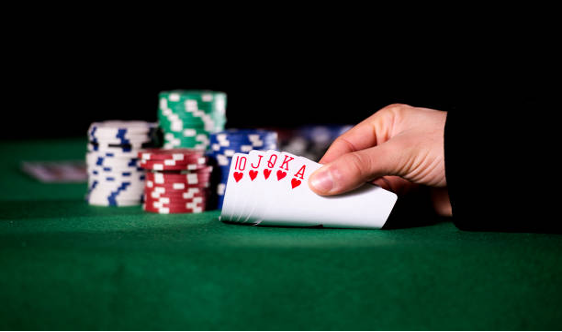Other
Poker Hands Ranked: Your Fundamental Guide To Boost Your Poker Game
Gamblers playing with cards.

Casual or serious poker players all want to improve their game. One way to up your game is to learn which hands you should be playing and how to play them. This blog post will provide a ranked list of the best poker hands and tips on how to play each one.
GGPoker is the world’s largest poker room, and it’s no surprise that they offer a wide variety of poker games.
However, knowing which game to choose with so many options can be challenging. That’s why GGPoker has developed a guide to poker hands ranked so that you can pick the perfect game for your skill level.
So whether you’re a beginner or a pro, read on for some essential information that will help take your poker skills to the next level!
The different types of poker hands
In poker, a variety of hand types can be dealt to you.
The poker hands in order are ranked from highest to lowest.
Royal Flush: A straight flush that includes the ace, king, queen, jack, and ten of the same suit.
Straight Flush: A flush that contains five cards in sequential order.
Four of a kind: Four cards of the same rank.
Full house: three cards of the same rank plus a pair.
Flush: Any five cards of the same suit.
Straight: Any five cards in sequential order.
Three of a kind: Three cards of the same rank.
Two pair: Two pairs of cards with different ranks.
One pair: Two cards of the same rank.
High card: The highest card in your hand.
While poker hands are typically ranked this way, variations can occur depending on the game.

Using your starting hand to make better decisions
When you sit at a poker table, you’re looking at a mixed bag of possibilities. To make the best decisions, you need to understand poker card rankings and how those rankings interact with the other cards on the table and your opponents’ betting patterns. That might sound like a lot to consider, but there are some key things you can do to put the odds in your favor with your starting hand.
First, if you have a pair of high cards, you’re already ahead of the game. But if you have two low cards, you might want to think twice about staying in. Also, suited cards are better than un-suited ones because they give you more opportunities to make a flush.
And finally, remember that position is vital when playing poker. The later you act hand, the more information you have to work with. So if you have a good starting hand and are in a late position, chances are better that you can make a good run.
Pro Tip: Refer to a poker hand hierarchy guide when starting to understand better which hands are worth playing.

When to play aggressively vs. passively
Playing poker involves many strategies. Some people like to play aggressively, betting and often raising to try and take control of the pot. Others prefer a more passive approach, calling and checking more often in an attempt to trap their opponents. So which strategy is better?
Well, it depends on the situation. You’ll want to play more aggressively to maximize your winnings if you have a strong hand. However, if you have a weaker hand, you may want to play more passively to avoid losing too much money. It’s all about knowing when to fold, call, and raise.
Poker is about reading your opponents and making the best decisions based on available information. So whether you’re playing aggressively or passively, just make sure you’re always paying attention!
Folding or staying: Factors to consider before deciding
There are times when it is better to fold your hand and give up the pot, and there are other times when it is better to stay in hand and try to win. So, when should you fold? It is usually best to fold if you have a hand that is unlikely to succeed, such as a high card or a single pair. You don’t want to waste your chips on a hand that will not likely pay off.
On the other hand, if you have a hand that is good but not great, such as two pair or three of a kind, then you may want to stay in hand and see if you can improve your combination by catching another card on the turn or river. Of course, you also need to consider what your opponents are doing. Ultimately, it is up to you to use your best judgment and make the decision that gives you the best chance of winning the pot.
Common beginner mistakes and how to avoid them
Poker is a great game, but it can be tough to master. That’s why many people make avoidable mistakes when starting. Here are the four most common poker mistakes and how to avoid them:
1. Not knowing the rules.
Before you play, be sure you understand the game’s basic rules. There’s nothing worse than losing because you made an illegal move!
2. Playing too many hands.
Trying to play every hand when you’re first starting is tempting, but that’s a sure way to lose money. Be selective about the hands you play, and don’t be afraid to fold if you don’t have a good hand.
3. Betting too much.
Another common mistake is betting too much on each hand. Poker is a game of patience and strategy, not pure luck. Don’t get too aggressive with your betting, or you’ll pass up good opportunities to win.
4. Not paying attention.
One of the essential things in poker is paying attention to what’s happening at the table. Keep your eyes open for other players’ bluffing signs, and learn to read the betting patterns. If you’re not paying attention, you’re sure to make mistakes that will cost you money.

Sign up at GGPoker today and start practicing with some of the best players in the world! With a bit of practice, you could be on your way to becoming a top-ranked player.
Home
Common Bathroom Remodeling Mistakes and How to Avoid Them

A bathroom remodel can enhance functionality, boost aesthetics, and increase home value. However, without careful planning, common mistakes can lead to wasted time, unnecessary expenses, and disappointing results. Understanding these pitfalls and learning how to avoid them ensures a smooth renovation process, delivering the ideal bathroom space you envision.

Neglecting a Comprehensive Plan
One of the biggest mistakes homeowners make is starting a remodel without a clear plan. Jumping into renovations without a well-defined budget, layout, and material selection can lead to costly delays and changes mid-project.
How to Avoid It:
Before starting, create a detailed remodeling plan outlining design preferences, must-have features, budget constraints, and a realistic timeline. Consulting professionals for guidance can help refine your vision and ensure a structured approach.
Ignoring Proper Ventilation
Bathrooms experience high humidity levels, and inadequate ventilation can result in mold growth, peeling paint, and moisture damage to walls and flooring. Many homeowners overlook the importance of proper airflow during a remodel.
How to Avoid It:
Install a high-quality exhaust fan to remove excess moisture, preventing condensation and mildew buildup. Ensure air circulation by placing vents strategically to maintain a fresh and dry bathroom environment.
Choosing the Wrong Materials
Selecting the wrong materials can lead to durability issues, premature wear, and maintenance headaches. Wood-based cabinets may warp due to moisture exposure, and porous flooring materials can absorb water, leading to damage over time.
How to Avoid It:
Opt for water-resistant materials suited for bathroom conditions. Porcelain or ceramic tiles, moisture-resistant paints, and sealed countertops withstand humidity while providing longevity and aesthetic appeal.
Overlooking Storage Solutions
A well-designed bathroom requires practical storage to keep toiletries, towels, and essentials organized. Many remodels prioritize aesthetics but fail to incorporate sufficient storage, leading to cluttered spaces.
How to Avoid It:
Include smart storage options such as recessed shelves, wall-mounted cabinets, and drawer organizers. Floating vanities with built-in compartments provide both style and functionality without occupying excess space.
Ignoring Lighting Needs
Poor lighting can make a bathroom feel dull and impractical. Insufficient illumination around mirrors and workspaces affects visibility, while relying solely on overhead fixtures can create harsh shadows.
How to Avoid It:
Layered lighting enhances ambiance and usability. Install vanity lights for even facial illumination, recessed lights for a balanced glow, and dimmable fixtures for customizable brightness levels.
Misjudging Plumbing Layout
Rearranging plumbing without careful assessment can lead to costly complications. Many homeowners attempt to relocate sinks, showers, or toilets without understanding structural limitations, resulting in unexpected expenses.
How to Avoid It:
Consult a plumber before making major layout adjustments. Keeping plumbing elements in their original locations minimizes complexity, reducing labor and material costs.
Overspending on Unnecessary Upgrades
It’s easy to get carried away with luxury fixtures and designer finishes, but unnecessary splurges can push a remodel over budget. Over-customization may also reduce future resale appeal.
How to Avoid It:
Prioritize essential upgrades that improve functionality and durability. Invest in quality faucets, efficient water-saving fixtures, and well-built vanities while balancing aesthetics with practicality.
Skipping Professional Help When Needed
While DIY renovations save money, certain tasks require expert handling. Improper electrical work, faulty plumbing installations, and incorrect tiling can lead to costly fixes later.
How to Avoid It:
Hire professionals like bathroom contractor for complex tasks like wiring, plumbing, and waterproofing to ensure safety and long-term efficiency. Balancing DIY efforts with expert assistance prevents mistakes and maintains high-quality results.
Conclusion
Avoiding common bathroom remodeling mistakes ensures a successful and stress-free renovation. By focusing on proper planning, material selection, lighting, ventilation, and professional expertise where necessary, homeowners can achieve a stylish, functional, and durable bathroom that meets both present and future needs. For expert renovation and waterproofing solutions in New York, trust Zicklincontracting.com to deliver quality craftsmanship and reliable service.
Other
Protect Your Email Reputation With This Advanced SPF Lookup Tool

In the current digital landscape, email is an indispensable and influential means of communication for both individuals and organizations. Nevertheless, the increase in cyber threats such as phishing, spam, and spoofing has made it vital to uphold a robust and reliable email reputation. Failing to implement appropriate security measures could result in your emails being classified as spam or even blocked, which can harm your reputation. One effective method to safeguard your email reputation is by utilizing SPF (Sender Policy Framework) records.
These records serve to confirm which servers are permitted to send emails on your behalf. By employing a sophisticated SPF lookup tool, you can effortlessly track, enhance, and protect your domain’s email authentication, ensuring that your messages successfully reach their desired recipients.
The Importance of Email Reputation
The reputation of your email reflects how reliable your messages seem to internet service providers (ISPs), spam detection systems, and the recipients themselves. This standing influences whether your emails reach the inbox, are diverted to the spam folder, or are completely blocked. Even if your content is genuine and beneficial, a negative reputation can significantly hinder your ability to deliver messages successfully.
For companies that depend significantly on email marketing, customer engagement, or transactional communications, low deliverability can result in lost income, reduced brand credibility, and a negative experience for users. As such, ensuring a robust email reputation is not merely a technical issue; it’s an essential strategic focus for the business.
What Is an SPF Record?
An SPF record is a specific kind of DNS (Domain Name System) entry that indicates which mail servers have permission to send emails for your domain. By creating and sharing an SPF record, you are informing receiving email servers that “only these designated IP addresses or servers can send emails claiming to be from my domain.”
Upon receiving an email, the server examines the SPF record to confirm the sender’s legitimacy. If the sender is not identified, the email could be classified as spam or denied. This process aids in safeguarding against deceptive communications.
However, SPF records cannot simply be established and left unattended. They need continuous oversight, refinement, and verification to maintain their effectiveness—this is where a sophisticated SPF lookup tool becomes essential.
Why Use an Advanced SPF Lookup Tool?
Ensuring Accuracy and Compliance
A significant number of domain administrators set up SPF records by hand, which frequently results in syntax mistakes, obsolete IP addresses, or partial entries. These errors can negatively impact email delivery and damage the reputation of the domain. An enhanced SPF lookup tool automates the verification process to prevent these issues. It identifies any misconfigurations and guarantees that your record adheres to up-to-date standards.
If your SPF records are not set up correctly, it may cause your emails to be rejected, regardless of the authenticity and purpose of your message. Additionally, having more than 10 DNS lookups can trigger a “permerror,” rendering the record invalid. Using a trustworthy SPF lookup tool can help identify these problems and offer recommendations for improvement.

Simplifying SPF Management for Complex Setups
Contemporary companies frequently utilize various external email services, including customer relationship management systems, marketing automation applications, or cloud-based transactional email providers. When it comes to overseeing SPF records in these scenarios, it can be challenging, particularly when several services require authorization to send emails on behalf of a single domain.
A sophisticated SPF lookup tool streamlines this intricate process. It retrieves, simplifies, and enhances nested SPF records, helping your domain adhere to DNS restrictions while remaining manageable. Additionally, it provides transparent insights into the IP addresses or providers that are permitted at any given time.
Real-Time Monitoring and Alerts
A key advantage of contemporary SPF lookup tools is their ability to monitor in real-time. Instead of having to check your records by hand, these tools send immediate notifications if there are any unauthorized alterations to your DNS settings. They also alert you when a reliable service modifies its SPF configuration. This allows you to promptly address any problems before they affect your email delivery.
This alert system enables you to respond swiftly, safeguarding your email operations and protecting your reputation. It is a vital tool for domains that handle large volumes of email or important transactional messages.
Key Features to Look for in an SPF Lookup Tool
Detailed Lookup and Flattening
An effective SPF lookup utility provides a comprehensive and transparent overview of your existing record while conducting recursive searches to identify all associated IP addresses and domains. It reveals any concealed or layered entries that could impact performance. Streamlining the record into a single optimized line enhances overall efficiency, which is particularly beneficial when approaching DNS lookup limits or requiring quicker resolution times.
Error Detection and Validation
Issues such as syntax mistakes, obsolete methods, or unapproved IP addresses can compromise your SPF record and affect the delivery of your emails. An advanced lookup tool effectively detects and highlights these issues. It also examines frequent errors, including absent “all” mechanisms or improper qualifiers, guaranteeing that your SPF configuration is both valid and functioning optimally.
Provider-Specific Insights
Different email service providers have unique approaches to organizing their SPF records; some may incorporate several include statements, while others frequently update their IP ranges. These differences can result in misconfigurations if not carefully tracked. An effective SPF tool should be capable of identifying typical providers and their behaviors, allowing it to automatically spot any missing entries or obsolete references in your configuration.
Historical Tracking and Reporting
Modifications to your SPF record may occasionally lead to unforeseen issues with email delivery. By maintaining a record of all SPF alterations, you can monitor these adjustments and assess their effects. This practice simplifies the process of pinpointing problems and reversing changes if necessary.
Certain sophisticated tools generate reports that connect modifications in SPF settings to the outcomes of email deliveries. This facilitates quicker and more precise identification of problems. Consequently, these insights enhance the efficiency of the troubleshooting procedure.
How an SPF Lookup Tool Protects Your Email Reputation
Preventing Unauthorized Use (Email Spoofing)
Spoofing poses a significant risk to your email reputation, as it involves unauthorized individuals sending messages that appear to come from your domain. Such malicious activity can severely harm your credibility and may result in being blacklisted. Maintaining an optimized and regularly monitored SPF record is crucial for safeguarding your domain. It specifies the servers authorized to send emails on your behalf, thereby greatly reducing the chances of your domain being misused in phishing or spam operations.

Increasing Inbox Placement
Integrating SPF with authentication methods such as DKIM and DMARC significantly increases the likelihood of your emails landing in the inbox rather than being marked as spam. Although SPF by itself doesn’t ensure successful delivery, it plays a vital role in the overall email authentication framework. When combined, these protocols create a more robust barrier against spoofing and phishing attempts, while also indicating to email service providers that your communications are reliable.
Internet Service Providers and email filtering systems consider SPF results among various criteria when deciding to accept or decline a message. If an SPF check fails, it can negatively influence the decision, particularly if your domain has a history of delivery issues.
Building Trust With Recipients
Consistently delivering emails to the inbox and successfully passing authentication checks gradually builds trust in your domain. This dependability assures recipients of the authenticity of your communications. Conversely, emails that are unreliable or lack proper authentication can create skepticism. Even dedicated subscribers might start to feel hesitant or overlook your messages.
Utilizing an SPF lookup tool guarantees that your domain upholds a positive reputation by accurately verifying permitted senders. It assists in keeping your records current and aligned with changing standards, thereby safeguarding your email deliverability and reliability.
When to Use an SPF Lookup Tool in 5 big lines points
- Before Launching New Email Campaigns: Utilize an SPF verification tool to confirm that all IP addresses used for sending emails and any third-party services associated with your new campaign are correctly authorized, which will help guarantee seamless email delivery from the outset.
- When Integrating or Removing Email Services: Whenever you include or eliminate a third-party email service, like marketing platforms, customer relationship management systems, or transactional email providers, performing an SPF lookup ensures that your DNS records accurately represent these modifications.
- After DNS or Server Changes: After making any updates to DNS, migrating domains, or changing servers, using an SPF lookup tool can swiftly confirm that your SPF record remains unchanged and has not been inadvertently modified or damaged.
- To Diagnose Deliverability Issues: Should you encounter bounced emails or get error messages related to SPF, conducting an SPF lookup can help identify any misconfigurations or issues within your SPF record that could be leading to these difficulties.
- As Part of Regular Email Security Audits: Regularly utilizing an SPF lookup tool is crucial for ensuring continuous adherence to email authentication guidelines, detecting any unauthorized modifications promptly, and enhancing your SPF configuration for optimal effectiveness.
Other
Gaming Updates LCFModGeeks – Your Go-To Source for the Latest in Gaming and Software
In today’s fast-paced digital era, the worlds of gaming and software are evolving at lightning speed. From high-definition graphics upgrades in popular games to critical bug fixes in productivity apps, updates are constantly rolling out to improve functionality, security, and user experience. For gamers, modders, and tech enthusiasts, staying on top of these updates is not just helpful—it’s essential. This is where Gaming Updates LCFModGeeks comes into play, serving as a reliable, community-driven hub for everything related to gaming and software updates.
Why Staying Updated Matters in Gaming and Software

Gaming isn’t just a pastime anymore; it’s a rapidly advancing ecosystem powered by continuous improvements. Whether it’s a new weapon system in a battle royale game or a critical security patch in system software, staying updated means staying competitive, safe, and optimized. Miss an update, and you could face lags, glitches, or even the inability to play with others online.
Outdated software can expose users to security vulnerabilities, compatibility issues, and reduced performance. For modders and gamers alike, missing an update might mean broken mods or corrupted save files. That’s why real-time access to reliable news and technical insights is more valuable than ever.
What is Gaming Updates LCFModGeeks?
Gaming Updates LCFModGeeks is a dedicated platform designed to bridge the gap between tech advancements and user awareness. It delivers timely, accurate, and detailed information on the latest game patches, modding trends, software upgrades, and everything in between. What makes it stand out is its strong focus on community—content is curated by tech-savvy gamers and software users who understand the nuances of both modding and mainstream use.
Whether you’re a casual player looking for updates on your favorite games or a software enthusiast exploring new tools, Gaming Updates LCFModGeeks is tailored to meet your needs.
Key Features of Gaming Updates LCFModGeeks

Real-Time Game News and Patch Details
At the heart of Gaming Updates LCFModGeeks is its commitment to keeping gamers in the loop. The platform provides real-time updates on popular titles such as Minecraft, Skyrim, Fortnite, and GTA V. But it doesn’t stop at just telling you an update has occurred—it explains what has changed, how it affects gameplay, and how to ensure your mods remain compatible.
Software and Security Alerts
Beyond gaming, the site also covers software updates across productivity, utility, and system tools. You’ll find news about critical security patches, performance tweaks, and feature releases that can significantly improve how you use your devices. Whether it’s an upgrade to your note-taking app or a new browser version, Gaming Updates LCFModGeeks keeps you informed and secure.
Community-Modding Support
Modding is an integral part of the modern gaming experience. From new character skins to expansive story mods, the possibilities are endless. Gaming Updates LCFModGeeks supports the modding community with tutorials, compatibility updates, and mod showcases. Beginners can learn how to get started, while experienced modders can explore advanced customization techniques and community contributions.
How Gaming Updates LCFModGeeks Enhances Your Experience
What makes Gaming Updates LCFModGeeks more than just a news site is its in-depth approach. Rather than simply reporting updates, the platform breaks down what they mean and offers practical advice for adapting. Encountering errors during installation? Facing mod conflicts after a game patch? LCFModGeeks provides clear, actionable guidance to resolve such issues quickly.
This knowledge-first model empowers users to navigate changes confidently and get the most out of their gaming and software tools.
What Sets Gaming Updates LCFModGeeks Apart?
A few key elements distinguish Gaming Updates LCFModGeeks from the crowd:
- Community-first content that is curated by real users with hands-on experience.
- Dual focus on both gaming and software updates, making it a one-stop resource.
- Consistent and detailed reporting with an emphasis on clarity and usability.
These strengths make it particularly valuable for users who don’t just want to stay updated—they want to understand the updates deeply.
Real Impact – Testimonials from the LCFModGeeks Community
Regular users of Gaming Updates LCFModGeeks often report significant improvements in their gaming and software experiences. From avoiding mod crashes to discovering powerful new tools, the site has proven itself as a practical and reliable guide.
One user shared how LCFModGeeks helped them navigate a major patch in Elden Ring that broke several community mods, saving hours of frustration. Another mentioned how a timely update alert helped secure their device from a software vulnerability before it was widely reported.
Navigating Gaming Updates LCFModGeeks
The platform is built with user experience in mind. Whether you’re on a desktop or mobile device, Gaming Updates LCFModGeeks features a clean interface, categorized sections, and intuitive navigation. From filtering updates by game title to browsing mod guides or patch notes, it’s designed to help you find what you need quickly and efficiently.
Conclusion
In a world where technology evolves by the minute, staying updated isn’t just smart—it’s vital. Whether you’re chasing the latest boss fight mechanics, keeping your modded game stable, or securing your software environment, Gaming Updates LCFModGeeks offers the insights and tools you need to stay one step ahead. Make it your go-to source, and experience the difference staying informed can make.
-

 Guides5 years ago
Guides5 years ago6 Proven Ways to Get more Instagram Likes on your Business Account
-

 Mainstream10 years ago
Mainstream10 years agoBioWare: Mass Effect 4 to Benefit From Dropping Last-Gen, Will Not Share Template With Dragon Age: Inquisition
-

 Mainstream6 years ago
Mainstream6 years agoHow to Buy Property & Safe Houses in GTA 5 (Grand Theft Auto 5)
-

 Casual2 years ago
Casual2 years ago8 Ways to Fix Over-Extrusion and Under-Extrusion in 3D Printing
-

 Mainstream12 years ago
Mainstream12 years agoGuild Wars 2: The eSports Dream and the sPvP Tragedy
-

 Guides10 months ago
Guides10 months agoFree Fire vs PUBG: Comparing Graphics, Gameplay, and More
-

 iOS Games2 years ago
iOS Games2 years agoThe Best Basketball Games for IOS
-

 Gaming News1 year ago
Gaming News1 year agoSwiping, Tapping, and Tilting: How Mobile Games Are Played Today
